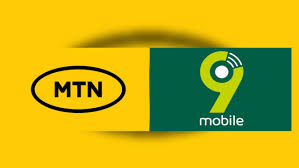Telecommunication giants MTN Nigeria and 9mobile have started testing a major radio access network-sharing agreement, with plans to fully implement the partnership across the country before the end of July. The deal, which was approved by the Nigerian Communications Commission (NCC), is expected to improve mobile coverage and service quality for millions of Nigerians, especially in underserved areas.
Under this new agreement, 9mobile will use MTN’s extensive radio access infrastructure to reach more customers, while still maintaining control over its core network, billing systems, and customer identity. This means that although MTN is providing part of the physical infrastructure, 9mobile will continue to manage its own customers independently.
Obafemi Banigbe, Chief Executive Officer of 9mobile, described the agreement as a big step forward in the company’s recovery efforts. Speaking during a joint press conference held in Lagos on Thursday, Banigbe said, “Today, we are proud to confirm that we have entered into a three-year national infrastructure-sharing agreement with MTN.”
He explained that the partnership is not a merger or acquisition but a commercial arrangement based on operational efficiency. “This partnership allows us to deliver better coverage by using MTN’s radio access infrastructure in areas where we currently have no presence. It is not a coalition or a merger, but a commercial agreement grounded in industry efficiency,” Banigbe said.
9mobile, once a strong competitor in Nigeria’s telecom space with over 23 million subscribers in 2015, has faced serious challenges over the last decade. The company now has about three million active users, representing only 1.9 percent of the mobile market, the smallest among the major operators. Customers have long complained of poor network quality, zero signal in many areas, slow internet service, and unresolved complaints, which have led to large numbers of users switching to other networks.
Data from the NCC shows that in just two months towards the end of 2024, over 6,000 9mobile users ported out to other networks, while very few new users ported in.
Banigbe said the partnership with MTN—Nigeria’s largest mobile operator with over 90 million subscribers—will allow 9mobile to focus on improving service quality and innovation without having to duplicate expensive infrastructure. “There is no freeloading here. This is not a subsidy or favour. Our subscribers remain 9mobile subscribers; they are billed by 9mobile, and their experience remains seamless,” he added.
Lynda Saint-Nwafor, Chief Enterprise Business Officer of MTN Nigeria, said the partnership represents a new way of working in the telecom industry. “We are excited to be part of a transition from pure competition to co-opetition—collaborating in areas where we can drive efficiency, while still competing on innovation and service quality,” she said.
Saint-Nwafor praised the Nigerian Communications Commission, especially its Executive Vice Chairman, Dr Aminu Maida, for supporting policies that promote infrastructure sharing. She also acknowledged the support of the Minister of Communications, Innovation and Digital Economy, Dr Bosun Tijani, for championing shared infrastructure as part of the national strategy.
According to Saint-Nwafor, the move to share radio access networks—not just towers—is in line with international best practices, especially in countries where spectrum and investment capital are limited. “We’ve now moved beyond tower sharing to radio access sharing. This is how we build a modern, capital-efficient, and customer-focused telecom industry,” she stated.
With the pilot phase already ongoing in some locations, both companies expect that the full rollout by July will bring improved network quality, lower operational costs, and faster broadband expansion. This development aligns with Nigeria’s National Broadband Plan, which aims to improve internet access across the country.
Banigbe also expressed hope that the agreement will spark more collaborations in the industry. “This collaboration unlocks new possibilities not just for us, but for the industry. It redefines what competition means and proves that innovation and collaboration can go hand-in-hand,” he said.
The telecom industry in Nigeria has become increasingly focused on shared infrastructure as a way to expand services quickly, cut costs, and deliver better experiences to customers in both urban and rural areas. As operators like MTN and 9mobile lead the way with network sharing, industry experts believe this could mark a new chapter for telecom services in the country.
